A Critical Evaluation of Levitt's Global Strategy in Business
VerifiedAdded on 2020/12/24
|18
|7094
|374
Essay
AI Summary
This essay critically evaluates Theodore Levitt's perspective on global strategy, focusing on the shift from multinational to global corporations. It examines Levitt's arguments on the standardization of products, the importance of low prices, and the changing consumer preferences in a globalized market. The essay explores the advantages of global entities focusing on consumer demand and the need for standardized products to achieve competitive advantage, while also acknowledging counterarguments regarding the product life cycle and market segmentation. Furthermore, it discusses the significance of branding and quality in consumer choices. The essay concludes by highlighting the importance of balancing global strategies with local considerations, emphasizing the need for businesses to 'think local' to gain consumer trust and preference in the evolving global landscape.
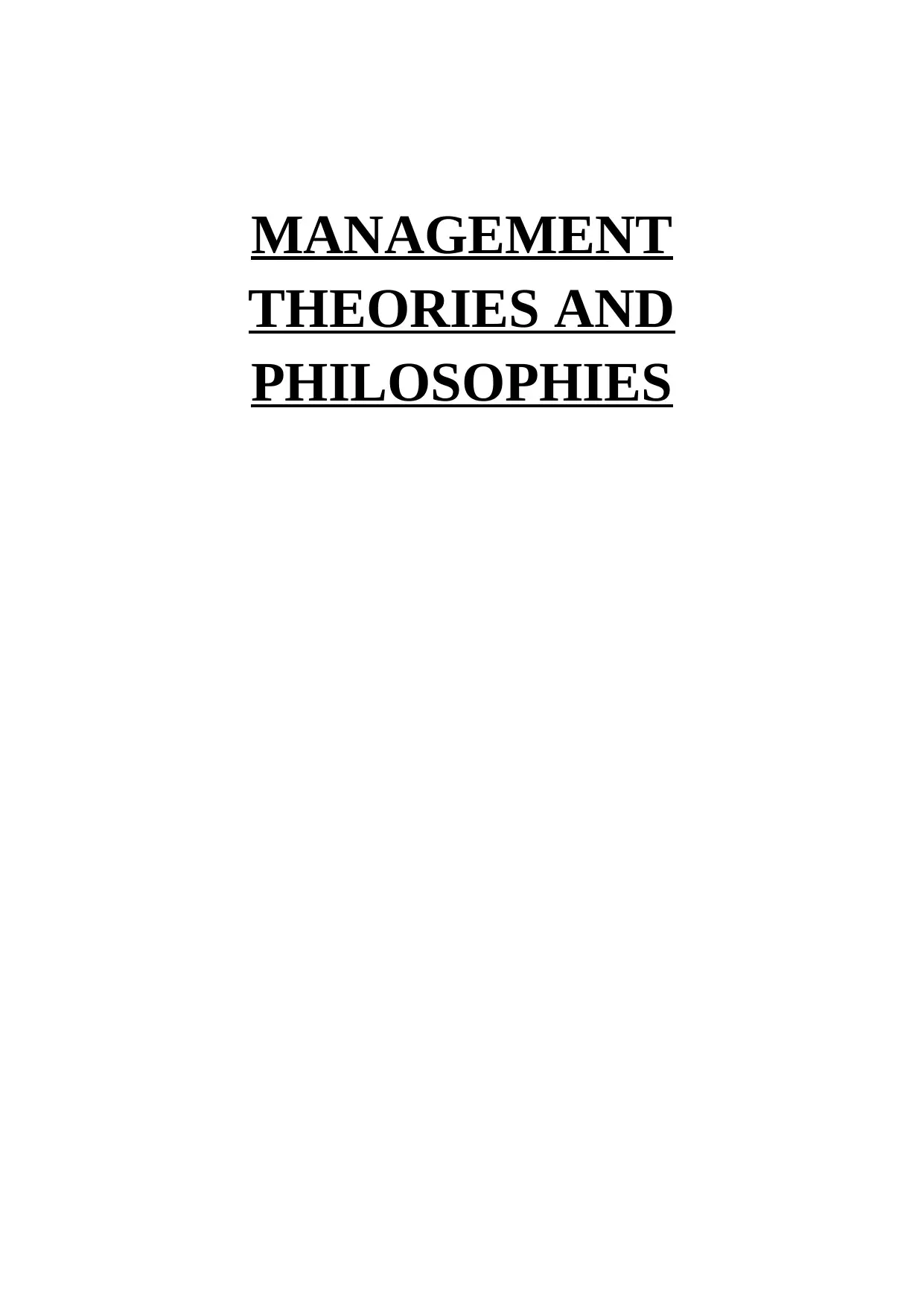
MANAGEMENT
THEORIES AND
PHILOSOPHIES
THEORIES AND
PHILOSOPHIES
Paraphrase This Document
Need a fresh take? Get an instant paraphrase of this document with our AI Paraphraser
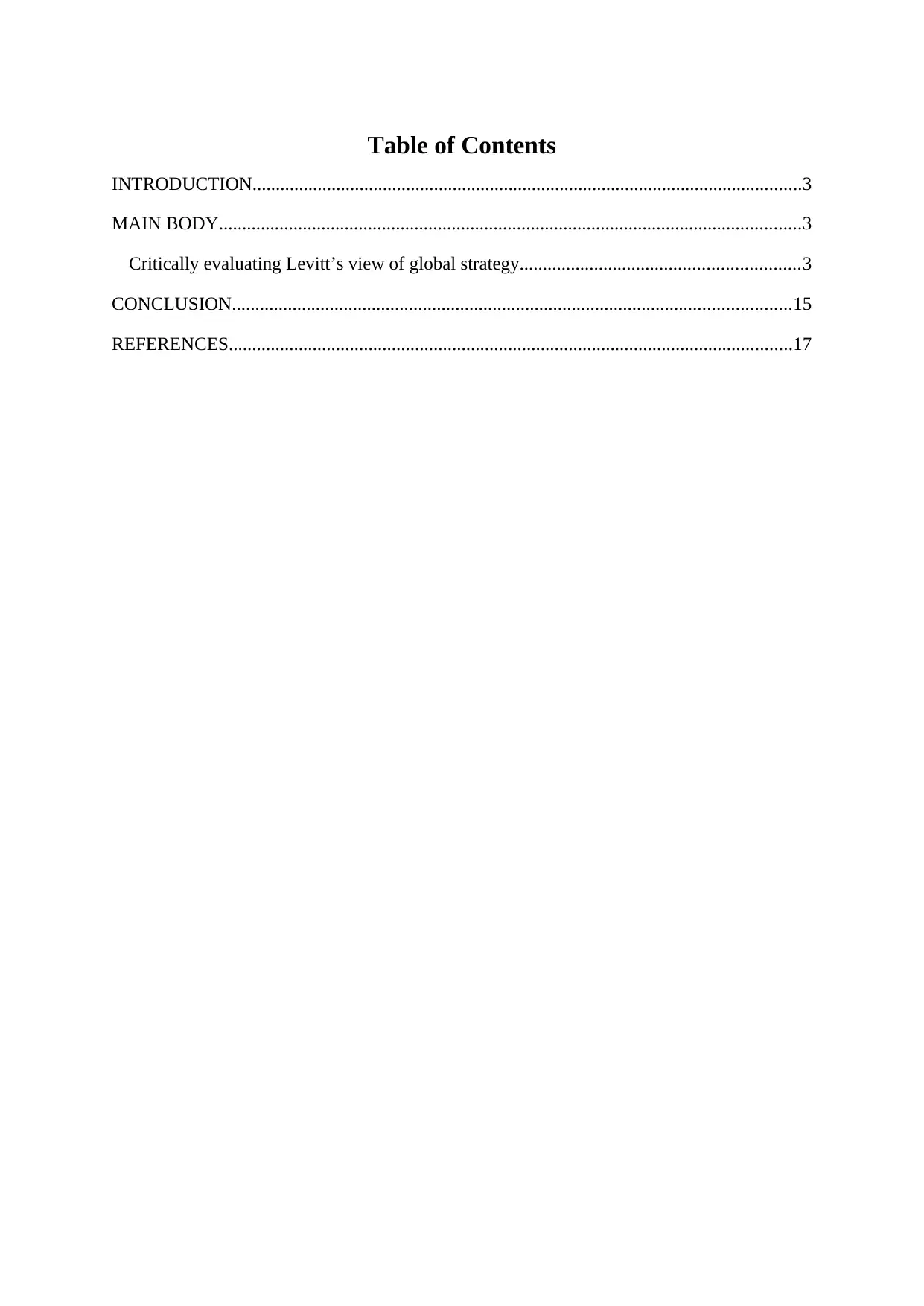
Table of Contents
INTRODUCTION......................................................................................................................3
MAIN BODY.............................................................................................................................3
Critically evaluating Levitt’s view of global strategy............................................................3
CONCLUSION........................................................................................................................15
REFERENCES.........................................................................................................................17
INTRODUCTION......................................................................................................................3
MAIN BODY.............................................................................................................................3
Critically evaluating Levitt’s view of global strategy............................................................3
CONCLUSION........................................................................................................................15
REFERENCES.........................................................................................................................17
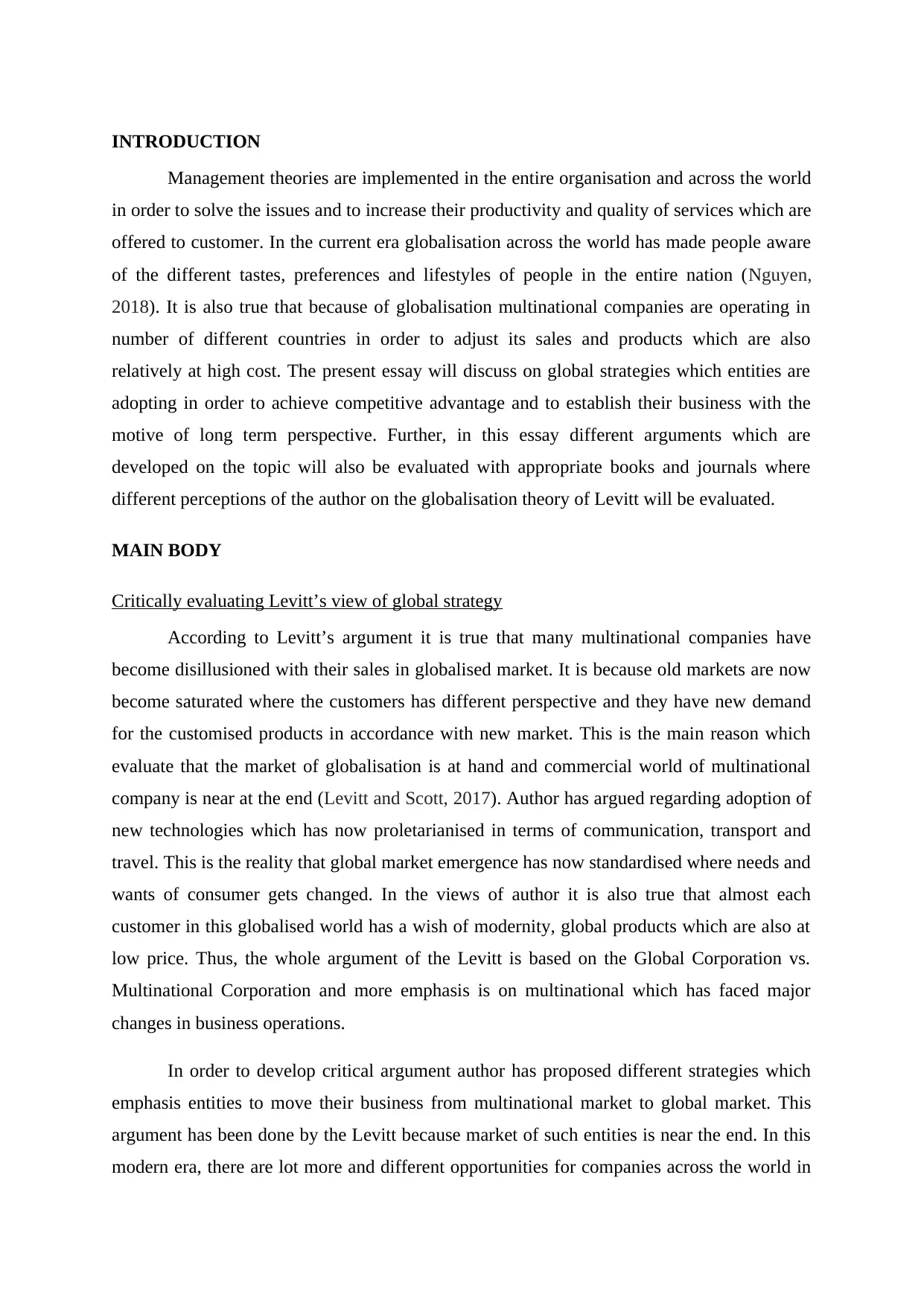
INTRODUCTION
Management theories are implemented in the entire organisation and across the world
in order to solve the issues and to increase their productivity and quality of services which are
offered to customer. In the current era globalisation across the world has made people aware
of the different tastes, preferences and lifestyles of people in the entire nation (Nguyen,
2018). It is also true that because of globalisation multinational companies are operating in
number of different countries in order to adjust its sales and products which are also
relatively at high cost. The present essay will discuss on global strategies which entities are
adopting in order to achieve competitive advantage and to establish their business with the
motive of long term perspective. Further, in this essay different arguments which are
developed on the topic will also be evaluated with appropriate books and journals where
different perceptions of the author on the globalisation theory of Levitt will be evaluated.
MAIN BODY
Critically evaluating Levitt’s view of global strategy
According to Levitt’s argument it is true that many multinational companies have
become disillusioned with their sales in globalised market. It is because old markets are now
become saturated where the customers has different perspective and they have new demand
for the customised products in accordance with new market. This is the main reason which
evaluate that the market of globalisation is at hand and commercial world of multinational
company is near at the end (Levitt and Scott, 2017). Author has argued regarding adoption of
new technologies which has now proletarianised in terms of communication, transport and
travel. This is the reality that global market emergence has now standardised where needs and
wants of consumer gets changed. In the views of author it is also true that almost each
customer in this globalised world has a wish of modernity, global products which are also at
low price. Thus, the whole argument of the Levitt is based on the Global Corporation vs.
Multinational Corporation and more emphasis is on multinational which has faced major
changes in business operations.
In order to develop critical argument author has proposed different strategies which
emphasis entities to move their business from multinational market to global market. This
argument has been done by the Levitt because market of such entities is near the end. In this
modern era, there are lot more and different opportunities for companies across the world in
Management theories are implemented in the entire organisation and across the world
in order to solve the issues and to increase their productivity and quality of services which are
offered to customer. In the current era globalisation across the world has made people aware
of the different tastes, preferences and lifestyles of people in the entire nation (Nguyen,
2018). It is also true that because of globalisation multinational companies are operating in
number of different countries in order to adjust its sales and products which are also
relatively at high cost. The present essay will discuss on global strategies which entities are
adopting in order to achieve competitive advantage and to establish their business with the
motive of long term perspective. Further, in this essay different arguments which are
developed on the topic will also be evaluated with appropriate books and journals where
different perceptions of the author on the globalisation theory of Levitt will be evaluated.
MAIN BODY
Critically evaluating Levitt’s view of global strategy
According to Levitt’s argument it is true that many multinational companies have
become disillusioned with their sales in globalised market. It is because old markets are now
become saturated where the customers has different perspective and they have new demand
for the customised products in accordance with new market. This is the main reason which
evaluate that the market of globalisation is at hand and commercial world of multinational
company is near at the end (Levitt and Scott, 2017). Author has argued regarding adoption of
new technologies which has now proletarianised in terms of communication, transport and
travel. This is the reality that global market emergence has now standardised where needs and
wants of consumer gets changed. In the views of author it is also true that almost each
customer in this globalised world has a wish of modernity, global products which are also at
low price. Thus, the whole argument of the Levitt is based on the Global Corporation vs.
Multinational Corporation and more emphasis is on multinational which has faced major
changes in business operations.
In order to develop critical argument author has proposed different strategies which
emphasis entities to move their business from multinational market to global market. This
argument has been done by the Levitt because market of such entities is near the end. In this
modern era, there are lot more and different opportunities for companies across the world in
⊘ This is a preview!⊘
Do you want full access?
Subscribe today to unlock all pages.

Trusted by 1+ million students worldwide
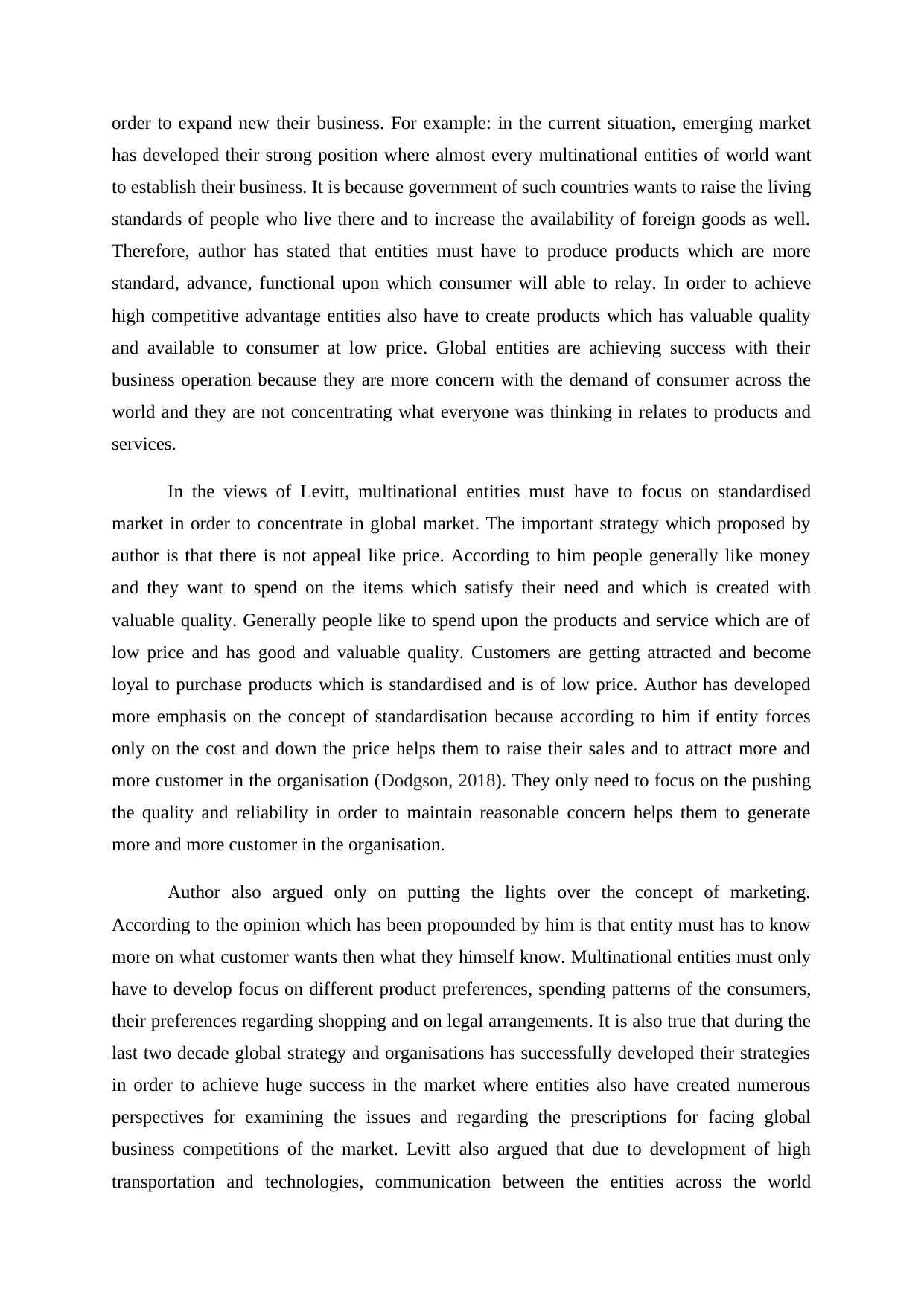
order to expand new their business. For example: in the current situation, emerging market
has developed their strong position where almost every multinational entities of world want
to establish their business. It is because government of such countries wants to raise the living
standards of people who live there and to increase the availability of foreign goods as well.
Therefore, author has stated that entities must have to produce products which are more
standard, advance, functional upon which consumer will able to relay. In order to achieve
high competitive advantage entities also have to create products which has valuable quality
and available to consumer at low price. Global entities are achieving success with their
business operation because they are more concern with the demand of consumer across the
world and they are not concentrating what everyone was thinking in relates to products and
services.
In the views of Levitt, multinational entities must have to focus on standardised
market in order to concentrate in global market. The important strategy which proposed by
author is that there is not appeal like price. According to him people generally like money
and they want to spend on the items which satisfy their need and which is created with
valuable quality. Generally people like to spend upon the products and service which are of
low price and has good and valuable quality. Customers are getting attracted and become
loyal to purchase products which is standardised and is of low price. Author has developed
more emphasis on the concept of standardisation because according to him if entity forces
only on the cost and down the price helps them to raise their sales and to attract more and
more customer in the organisation (Dodgson, 2018). They only need to focus on the pushing
the quality and reliability in order to maintain reasonable concern helps them to generate
more and more customer in the organisation.
Author also argued only on putting the lights over the concept of marketing.
According to the opinion which has been propounded by him is that entity must has to know
more on what customer wants then what they himself know. Multinational entities must only
have to develop focus on different product preferences, spending patterns of the consumers,
their preferences regarding shopping and on legal arrangements. It is also true that during the
last two decade global strategy and organisations has successfully developed their strategies
in order to achieve huge success in the market where entities also have created numerous
perspectives for examining the issues and regarding the prescriptions for facing global
business competitions of the market. Levitt also argued that due to development of high
transportation and technologies, communication between the entities across the world
has developed their strong position where almost every multinational entities of world want
to establish their business. It is because government of such countries wants to raise the living
standards of people who live there and to increase the availability of foreign goods as well.
Therefore, author has stated that entities must have to produce products which are more
standard, advance, functional upon which consumer will able to relay. In order to achieve
high competitive advantage entities also have to create products which has valuable quality
and available to consumer at low price. Global entities are achieving success with their
business operation because they are more concern with the demand of consumer across the
world and they are not concentrating what everyone was thinking in relates to products and
services.
In the views of Levitt, multinational entities must have to focus on standardised
market in order to concentrate in global market. The important strategy which proposed by
author is that there is not appeal like price. According to him people generally like money
and they want to spend on the items which satisfy their need and which is created with
valuable quality. Generally people like to spend upon the products and service which are of
low price and has good and valuable quality. Customers are getting attracted and become
loyal to purchase products which is standardised and is of low price. Author has developed
more emphasis on the concept of standardisation because according to him if entity forces
only on the cost and down the price helps them to raise their sales and to attract more and
more customer in the organisation (Dodgson, 2018). They only need to focus on the pushing
the quality and reliability in order to maintain reasonable concern helps them to generate
more and more customer in the organisation.
Author also argued only on putting the lights over the concept of marketing.
According to the opinion which has been propounded by him is that entity must has to know
more on what customer wants then what they himself know. Multinational entities must only
have to develop focus on different product preferences, spending patterns of the consumers,
their preferences regarding shopping and on legal arrangements. It is also true that during the
last two decade global strategy and organisations has successfully developed their strategies
in order to achieve huge success in the market where entities also have created numerous
perspectives for examining the issues and regarding the prescriptions for facing global
business competitions of the market. Levitt also argued that due to development of high
transportation and technologies, communication between the entities across the world
Paraphrase This Document
Need a fresh take? Get an instant paraphrase of this document with our AI Paraphraser
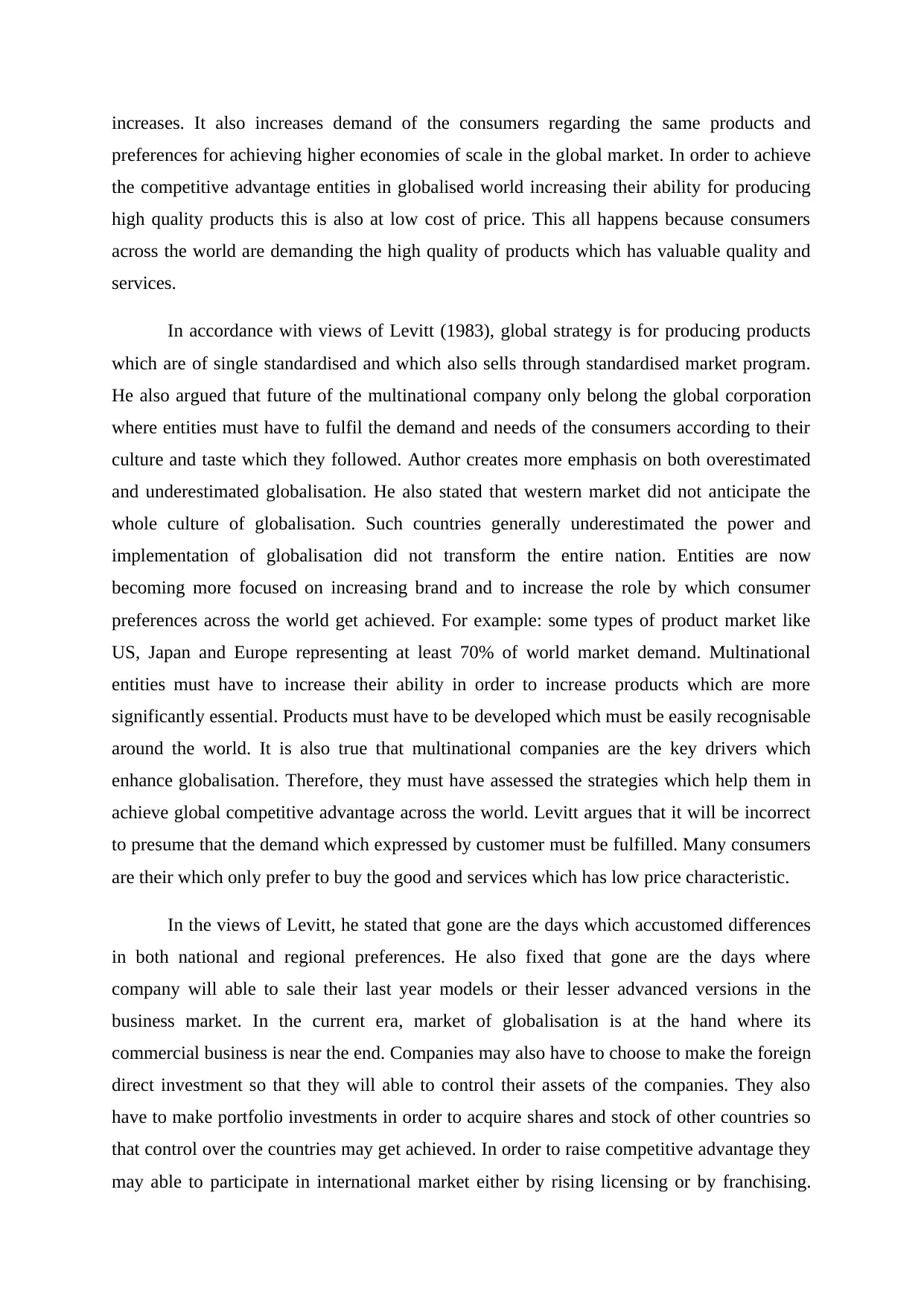
increases. It also increases demand of the consumers regarding the same products and
preferences for achieving higher economies of scale in the global market. In order to achieve
the competitive advantage entities in globalised world increasing their ability for producing
high quality products this is also at low cost of price. This all happens because consumers
across the world are demanding the high quality of products which has valuable quality and
services.
In accordance with views of Levitt (1983), global strategy is for producing products
which are of single standardised and which also sells through standardised market program.
He also argued that future of the multinational company only belong the global corporation
where entities must have to fulfil the demand and needs of the consumers according to their
culture and taste which they followed. Author creates more emphasis on both overestimated
and underestimated globalisation. He also stated that western market did not anticipate the
whole culture of globalisation. Such countries generally underestimated the power and
implementation of globalisation did not transform the entire nation. Entities are now
becoming more focused on increasing brand and to increase the role by which consumer
preferences across the world get achieved. For example: some types of product market like
US, Japan and Europe representing at least 70% of world market demand. Multinational
entities must have to increase their ability in order to increase products which are more
significantly essential. Products must have to be developed which must be easily recognisable
around the world. It is also true that multinational companies are the key drivers which
enhance globalisation. Therefore, they must have assessed the strategies which help them in
achieve global competitive advantage across the world. Levitt argues that it will be incorrect
to presume that the demand which expressed by customer must be fulfilled. Many consumers
are their which only prefer to buy the good and services which has low price characteristic.
In the views of Levitt, he stated that gone are the days which accustomed differences
in both national and regional preferences. He also fixed that gone are the days where
company will able to sale their last year models or their lesser advanced versions in the
business market. In the current era, market of globalisation is at the hand where its
commercial business is near the end. Companies may also have to choose to make the foreign
direct investment so that they will able to control their assets of the companies. They also
have to make portfolio investments in order to acquire shares and stock of other countries so
that control over the countries may get achieved. In order to raise competitive advantage they
may able to participate in international market either by rising licensing or by franchising.
preferences for achieving higher economies of scale in the global market. In order to achieve
the competitive advantage entities in globalised world increasing their ability for producing
high quality products this is also at low cost of price. This all happens because consumers
across the world are demanding the high quality of products which has valuable quality and
services.
In accordance with views of Levitt (1983), global strategy is for producing products
which are of single standardised and which also sells through standardised market program.
He also argued that future of the multinational company only belong the global corporation
where entities must have to fulfil the demand and needs of the consumers according to their
culture and taste which they followed. Author creates more emphasis on both overestimated
and underestimated globalisation. He also stated that western market did not anticipate the
whole culture of globalisation. Such countries generally underestimated the power and
implementation of globalisation did not transform the entire nation. Entities are now
becoming more focused on increasing brand and to increase the role by which consumer
preferences across the world get achieved. For example: some types of product market like
US, Japan and Europe representing at least 70% of world market demand. Multinational
entities must have to increase their ability in order to increase products which are more
significantly essential. Products must have to be developed which must be easily recognisable
around the world. It is also true that multinational companies are the key drivers which
enhance globalisation. Therefore, they must have assessed the strategies which help them in
achieve global competitive advantage across the world. Levitt argues that it will be incorrect
to presume that the demand which expressed by customer must be fulfilled. Many consumers
are their which only prefer to buy the good and services which has low price characteristic.
In the views of Levitt, he stated that gone are the days which accustomed differences
in both national and regional preferences. He also fixed that gone are the days where
company will able to sale their last year models or their lesser advanced versions in the
business market. In the current era, market of globalisation is at the hand where its
commercial business is near the end. Companies may also have to choose to make the foreign
direct investment so that they will able to control their assets of the companies. They also
have to make portfolio investments in order to acquire shares and stock of other countries so
that control over the countries may get achieved. In order to raise competitive advantage they
may able to participate in international market either by rising licensing or by franchising.
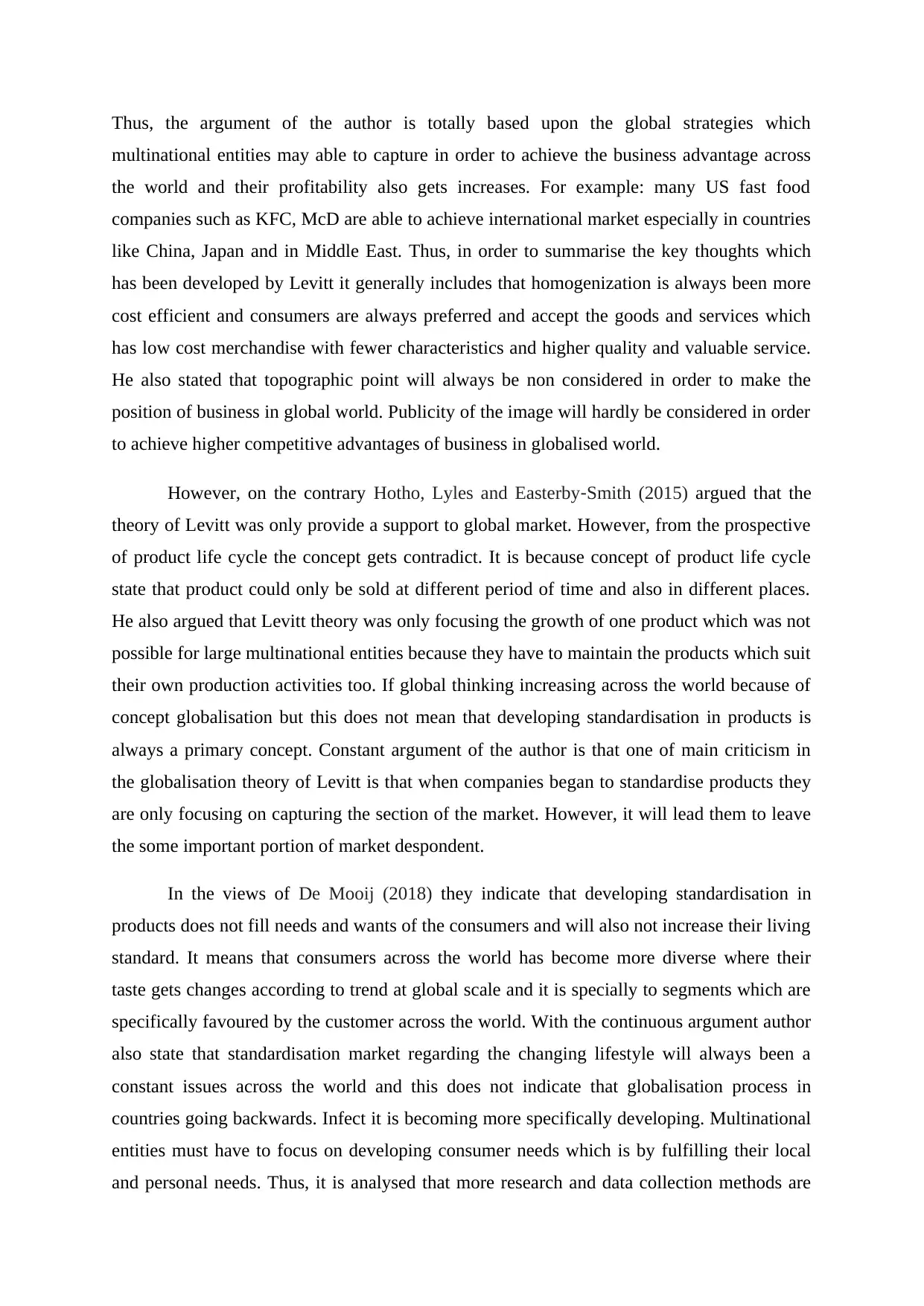
Thus, the argument of the author is totally based upon the global strategies which
multinational entities may able to capture in order to achieve the business advantage across
the world and their profitability also gets increases. For example: many US fast food
companies such as KFC, McD are able to achieve international market especially in countries
like China, Japan and in Middle East. Thus, in order to summarise the key thoughts which
has been developed by Levitt it generally includes that homogenization is always been more
cost efficient and consumers are always preferred and accept the goods and services which
has low cost merchandise with fewer characteristics and higher quality and valuable service.
He also stated that topographic point will always be non considered in order to make the
position of business in global world. Publicity of the image will hardly be considered in order
to achieve higher competitive advantages of business in globalised world.
However, on the contrary Hotho, Lyles and Easterby‐Smith (2015) argued that the
theory of Levitt was only provide a support to global market. However, from the prospective
of product life cycle the concept gets contradict. It is because concept of product life cycle
state that product could only be sold at different period of time and also in different places.
He also argued that Levitt theory was only focusing the growth of one product which was not
possible for large multinational entities because they have to maintain the products which suit
their own production activities too. If global thinking increasing across the world because of
concept globalisation but this does not mean that developing standardisation in products is
always a primary concept. Constant argument of the author is that one of main criticism in
the globalisation theory of Levitt is that when companies began to standardise products they
are only focusing on capturing the section of the market. However, it will lead them to leave
the some important portion of market despondent.
In the views of De Mooij (2018) they indicate that developing standardisation in
products does not fill needs and wants of the consumers and will also not increase their living
standard. It means that consumers across the world has become more diverse where their
taste gets changes according to trend at global scale and it is specially to segments which are
specifically favoured by the customer across the world. With the continuous argument author
also state that standardisation market regarding the changing lifestyle will always been a
constant issues across the world and this does not indicate that globalisation process in
countries going backwards. Infect it is becoming more specifically developing. Multinational
entities must have to focus on developing consumer needs which is by fulfilling their local
and personal needs. Thus, it is analysed that more research and data collection methods are
multinational entities may able to capture in order to achieve the business advantage across
the world and their profitability also gets increases. For example: many US fast food
companies such as KFC, McD are able to achieve international market especially in countries
like China, Japan and in Middle East. Thus, in order to summarise the key thoughts which
has been developed by Levitt it generally includes that homogenization is always been more
cost efficient and consumers are always preferred and accept the goods and services which
has low cost merchandise with fewer characteristics and higher quality and valuable service.
He also stated that topographic point will always be non considered in order to make the
position of business in global world. Publicity of the image will hardly be considered in order
to achieve higher competitive advantages of business in globalised world.
However, on the contrary Hotho, Lyles and Easterby‐Smith (2015) argued that the
theory of Levitt was only provide a support to global market. However, from the prospective
of product life cycle the concept gets contradict. It is because concept of product life cycle
state that product could only be sold at different period of time and also in different places.
He also argued that Levitt theory was only focusing the growth of one product which was not
possible for large multinational entities because they have to maintain the products which suit
their own production activities too. If global thinking increasing across the world because of
concept globalisation but this does not mean that developing standardisation in products is
always a primary concept. Constant argument of the author is that one of main criticism in
the globalisation theory of Levitt is that when companies began to standardise products they
are only focusing on capturing the section of the market. However, it will lead them to leave
the some important portion of market despondent.
In the views of De Mooij (2018) they indicate that developing standardisation in
products does not fill needs and wants of the consumers and will also not increase their living
standard. It means that consumers across the world has become more diverse where their
taste gets changes according to trend at global scale and it is specially to segments which are
specifically favoured by the customer across the world. With the continuous argument author
also state that standardisation market regarding the changing lifestyle will always been a
constant issues across the world and this does not indicate that globalisation process in
countries going backwards. Infect it is becoming more specifically developing. Multinational
entities must have to focus on developing consumer needs which is by fulfilling their local
and personal needs. Thus, it is analysed that more research and data collection methods are
⊘ This is a preview!⊘
Do you want full access?
Subscribe today to unlock all pages.

Trusted by 1+ million students worldwide
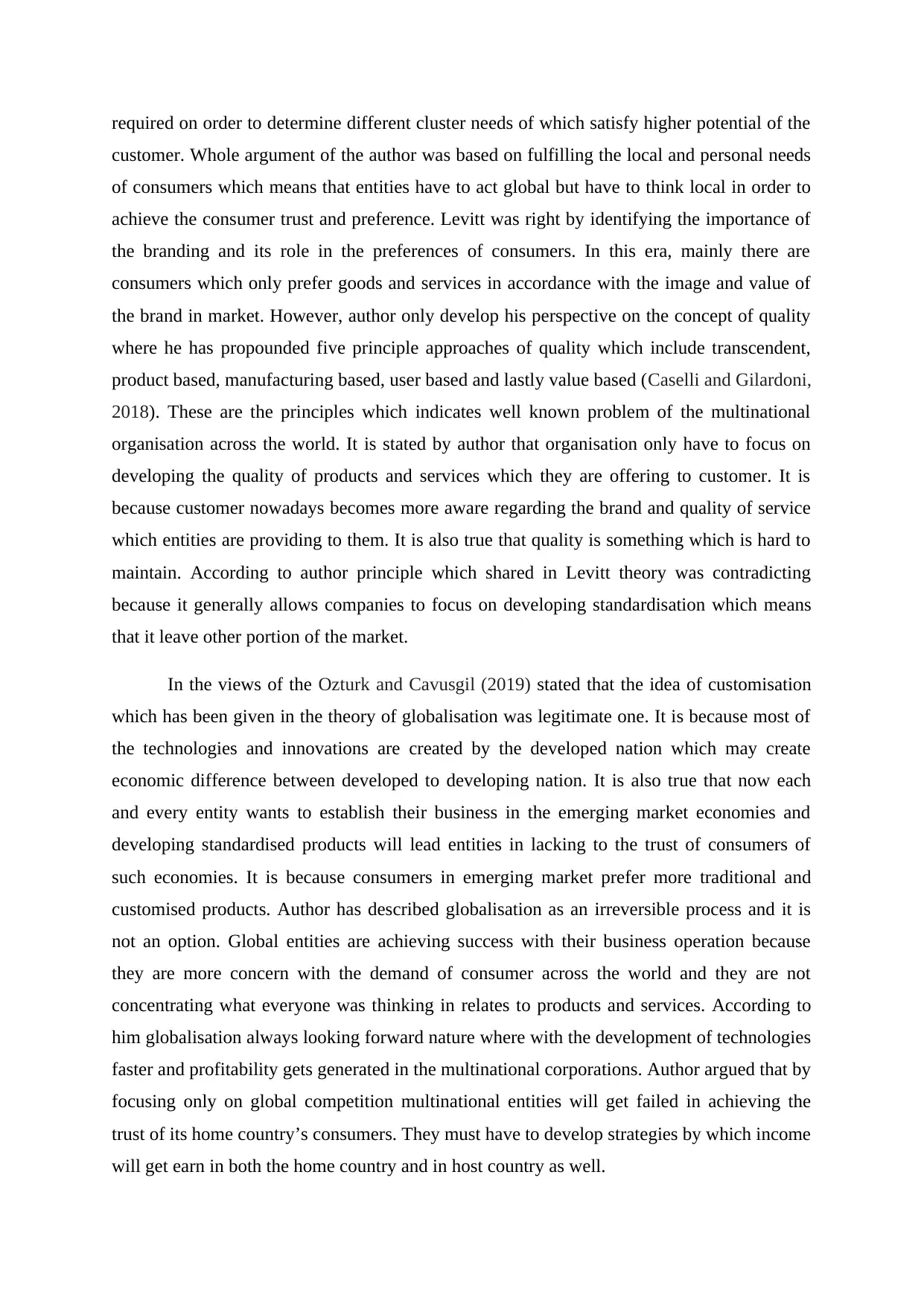
required on order to determine different cluster needs of which satisfy higher potential of the
customer. Whole argument of the author was based on fulfilling the local and personal needs
of consumers which means that entities have to act global but have to think local in order to
achieve the consumer trust and preference. Levitt was right by identifying the importance of
the branding and its role in the preferences of consumers. In this era, mainly there are
consumers which only prefer goods and services in accordance with the image and value of
the brand in market. However, author only develop his perspective on the concept of quality
where he has propounded five principle approaches of quality which include transcendent,
product based, manufacturing based, user based and lastly value based (Caselli and Gilardoni,
2018). These are the principles which indicates well known problem of the multinational
organisation across the world. It is stated by author that organisation only have to focus on
developing the quality of products and services which they are offering to customer. It is
because customer nowadays becomes more aware regarding the brand and quality of service
which entities are providing to them. It is also true that quality is something which is hard to
maintain. According to author principle which shared in Levitt theory was contradicting
because it generally allows companies to focus on developing standardisation which means
that it leave other portion of the market.
In the views of the Ozturk and Cavusgil (2019) stated that the idea of customisation
which has been given in the theory of globalisation was legitimate one. It is because most of
the technologies and innovations are created by the developed nation which may create
economic difference between developed to developing nation. It is also true that now each
and every entity wants to establish their business in the emerging market economies and
developing standardised products will lead entities in lacking to the trust of consumers of
such economies. It is because consumers in emerging market prefer more traditional and
customised products. Author has described globalisation as an irreversible process and it is
not an option. Global entities are achieving success with their business operation because
they are more concern with the demand of consumer across the world and they are not
concentrating what everyone was thinking in relates to products and services. According to
him globalisation always looking forward nature where with the development of technologies
faster and profitability gets generated in the multinational corporations. Author argued that by
focusing only on global competition multinational entities will get failed in achieving the
trust of its home country’s consumers. They must have to develop strategies by which income
will get earn in both the home country and in host country as well.
customer. Whole argument of the author was based on fulfilling the local and personal needs
of consumers which means that entities have to act global but have to think local in order to
achieve the consumer trust and preference. Levitt was right by identifying the importance of
the branding and its role in the preferences of consumers. In this era, mainly there are
consumers which only prefer goods and services in accordance with the image and value of
the brand in market. However, author only develop his perspective on the concept of quality
where he has propounded five principle approaches of quality which include transcendent,
product based, manufacturing based, user based and lastly value based (Caselli and Gilardoni,
2018). These are the principles which indicates well known problem of the multinational
organisation across the world. It is stated by author that organisation only have to focus on
developing the quality of products and services which they are offering to customer. It is
because customer nowadays becomes more aware regarding the brand and quality of service
which entities are providing to them. It is also true that quality is something which is hard to
maintain. According to author principle which shared in Levitt theory was contradicting
because it generally allows companies to focus on developing standardisation which means
that it leave other portion of the market.
In the views of the Ozturk and Cavusgil (2019) stated that the idea of customisation
which has been given in the theory of globalisation was legitimate one. It is because most of
the technologies and innovations are created by the developed nation which may create
economic difference between developed to developing nation. It is also true that now each
and every entity wants to establish their business in the emerging market economies and
developing standardised products will lead entities in lacking to the trust of consumers of
such economies. It is because consumers in emerging market prefer more traditional and
customised products. Author has described globalisation as an irreversible process and it is
not an option. Global entities are achieving success with their business operation because
they are more concern with the demand of consumer across the world and they are not
concentrating what everyone was thinking in relates to products and services. According to
him globalisation always looking forward nature where with the development of technologies
faster and profitability gets generated in the multinational corporations. Author argued that by
focusing only on global competition multinational entities will get failed in achieving the
trust of its home country’s consumers. They must have to develop strategies by which income
will get earn in both the home country and in host country as well.
Paraphrase This Document
Need a fresh take? Get an instant paraphrase of this document with our AI Paraphraser
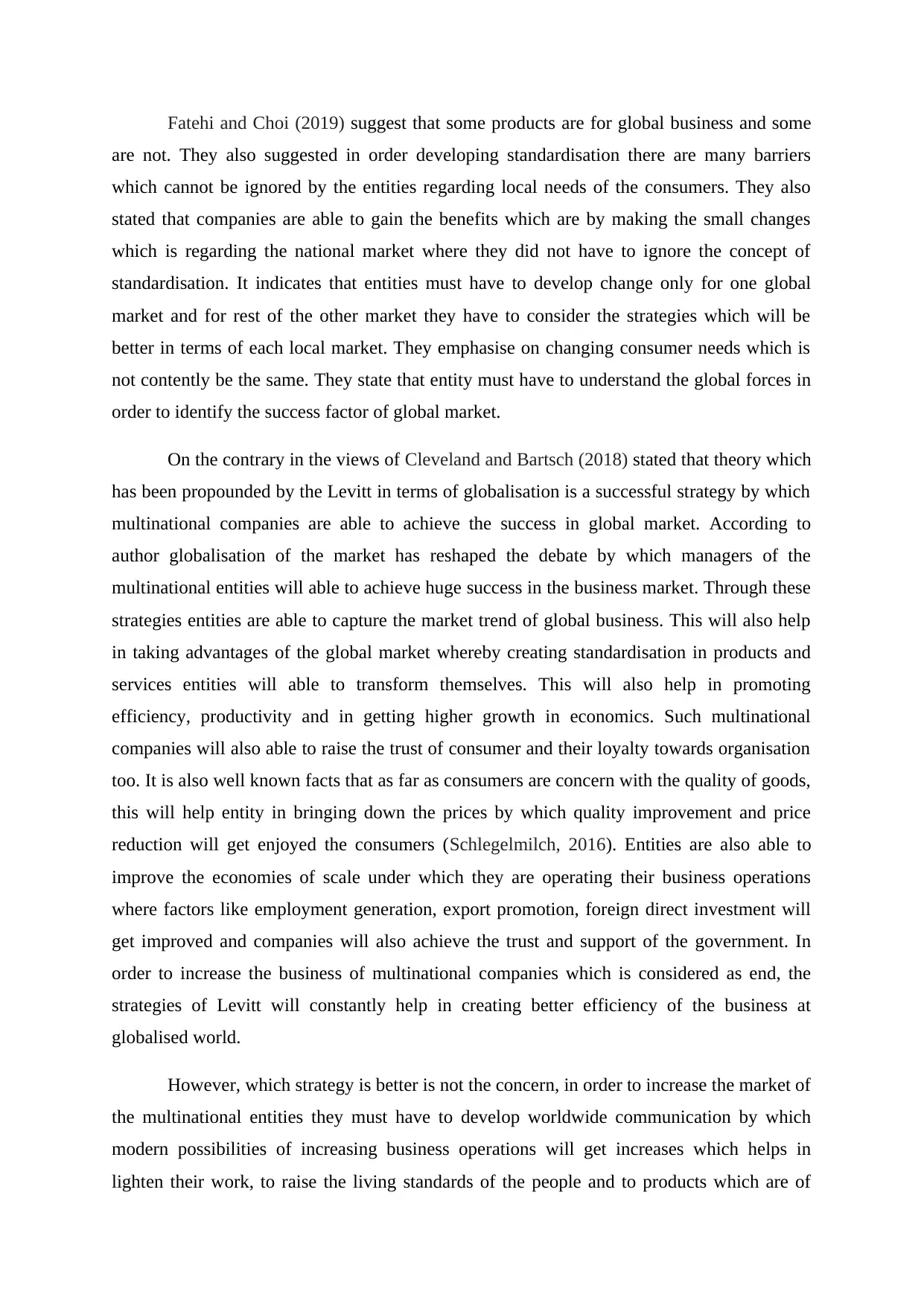
Fatehi and Choi (2019) suggest that some products are for global business and some
are not. They also suggested in order developing standardisation there are many barriers
which cannot be ignored by the entities regarding local needs of the consumers. They also
stated that companies are able to gain the benefits which are by making the small changes
which is regarding the national market where they did not have to ignore the concept of
standardisation. It indicates that entities must have to develop change only for one global
market and for rest of the other market they have to consider the strategies which will be
better in terms of each local market. They emphasise on changing consumer needs which is
not contently be the same. They state that entity must have to understand the global forces in
order to identify the success factor of global market.
On the contrary in the views of Cleveland and Bartsch (2018) stated that theory which
has been propounded by the Levitt in terms of globalisation is a successful strategy by which
multinational companies are able to achieve the success in global market. According to
author globalisation of the market has reshaped the debate by which managers of the
multinational entities will able to achieve huge success in the business market. Through these
strategies entities are able to capture the market trend of global business. This will also help
in taking advantages of the global market whereby creating standardisation in products and
services entities will able to transform themselves. This will also help in promoting
efficiency, productivity and in getting higher growth in economics. Such multinational
companies will also able to raise the trust of consumer and their loyalty towards organisation
too. It is also well known facts that as far as consumers are concern with the quality of goods,
this will help entity in bringing down the prices by which quality improvement and price
reduction will get enjoyed the consumers (Schlegelmilch, 2016). Entities are also able to
improve the economies of scale under which they are operating their business operations
where factors like employment generation, export promotion, foreign direct investment will
get improved and companies will also achieve the trust and support of the government. In
order to increase the business of multinational companies which is considered as end, the
strategies of Levitt will constantly help in creating better efficiency of the business at
globalised world.
However, which strategy is better is not the concern, in order to increase the market of
the multinational entities they must have to develop worldwide communication by which
modern possibilities of increasing business operations will get increases which helps in
lighten their work, to raise the living standards of the people and to products which are of
are not. They also suggested in order developing standardisation there are many barriers
which cannot be ignored by the entities regarding local needs of the consumers. They also
stated that companies are able to gain the benefits which are by making the small changes
which is regarding the national market where they did not have to ignore the concept of
standardisation. It indicates that entities must have to develop change only for one global
market and for rest of the other market they have to consider the strategies which will be
better in terms of each local market. They emphasise on changing consumer needs which is
not contently be the same. They state that entity must have to understand the global forces in
order to identify the success factor of global market.
On the contrary in the views of Cleveland and Bartsch (2018) stated that theory which
has been propounded by the Levitt in terms of globalisation is a successful strategy by which
multinational companies are able to achieve the success in global market. According to
author globalisation of the market has reshaped the debate by which managers of the
multinational entities will able to achieve huge success in the business market. Through these
strategies entities are able to capture the market trend of global business. This will also help
in taking advantages of the global market whereby creating standardisation in products and
services entities will able to transform themselves. This will also help in promoting
efficiency, productivity and in getting higher growth in economics. Such multinational
companies will also able to raise the trust of consumer and their loyalty towards organisation
too. It is also well known facts that as far as consumers are concern with the quality of goods,
this will help entity in bringing down the prices by which quality improvement and price
reduction will get enjoyed the consumers (Schlegelmilch, 2016). Entities are also able to
improve the economies of scale under which they are operating their business operations
where factors like employment generation, export promotion, foreign direct investment will
get improved and companies will also achieve the trust and support of the government. In
order to increase the business of multinational companies which is considered as end, the
strategies of Levitt will constantly help in creating better efficiency of the business at
globalised world.
However, which strategy is better is not the concern, in order to increase the market of
the multinational entities they must have to develop worldwide communication by which
modern possibilities of increasing business operations will get increases which helps in
lighten their work, to raise the living standards of the people and to products which are of
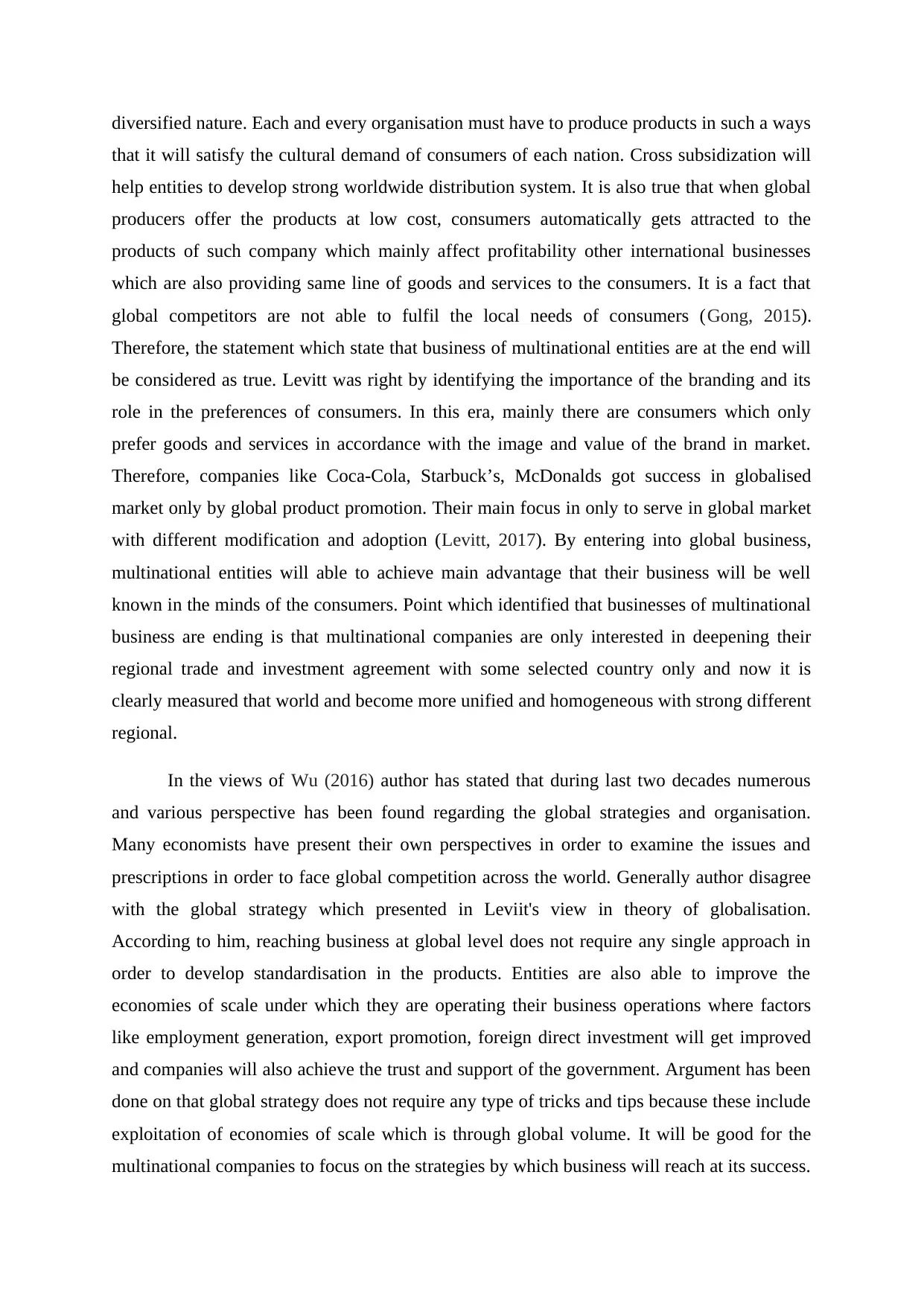
diversified nature. Each and every organisation must have to produce products in such a ways
that it will satisfy the cultural demand of consumers of each nation. Cross subsidization will
help entities to develop strong worldwide distribution system. It is also true that when global
producers offer the products at low cost, consumers automatically gets attracted to the
products of such company which mainly affect profitability other international businesses
which are also providing same line of goods and services to the consumers. It is a fact that
global competitors are not able to fulfil the local needs of consumers (Gong, 2015).
Therefore, the statement which state that business of multinational entities are at the end will
be considered as true. Levitt was right by identifying the importance of the branding and its
role in the preferences of consumers. In this era, mainly there are consumers which only
prefer goods and services in accordance with the image and value of the brand in market.
Therefore, companies like Coca-Cola, Starbuck’s, McDonalds got success in globalised
market only by global product promotion. Their main focus in only to serve in global market
with different modification and adoption (Levitt, 2017). By entering into global business,
multinational entities will able to achieve main advantage that their business will be well
known in the minds of the consumers. Point which identified that businesses of multinational
business are ending is that multinational companies are only interested in deepening their
regional trade and investment agreement with some selected country only and now it is
clearly measured that world and become more unified and homogeneous with strong different
regional.
In the views of Wu (2016) author has stated that during last two decades numerous
and various perspective has been found regarding the global strategies and organisation.
Many economists have present their own perspectives in order to examine the issues and
prescriptions in order to face global competition across the world. Generally author disagree
with the global strategy which presented in Leviit's view in theory of globalisation.
According to him, reaching business at global level does not require any single approach in
order to develop standardisation in the products. Entities are also able to improve the
economies of scale under which they are operating their business operations where factors
like employment generation, export promotion, foreign direct investment will get improved
and companies will also achieve the trust and support of the government. Argument has been
done on that global strategy does not require any type of tricks and tips because these include
exploitation of economies of scale which is through global volume. It will be good for the
multinational companies to focus on the strategies by which business will reach at its success.
that it will satisfy the cultural demand of consumers of each nation. Cross subsidization will
help entities to develop strong worldwide distribution system. It is also true that when global
producers offer the products at low cost, consumers automatically gets attracted to the
products of such company which mainly affect profitability other international businesses
which are also providing same line of goods and services to the consumers. It is a fact that
global competitors are not able to fulfil the local needs of consumers (Gong, 2015).
Therefore, the statement which state that business of multinational entities are at the end will
be considered as true. Levitt was right by identifying the importance of the branding and its
role in the preferences of consumers. In this era, mainly there are consumers which only
prefer goods and services in accordance with the image and value of the brand in market.
Therefore, companies like Coca-Cola, Starbuck’s, McDonalds got success in globalised
market only by global product promotion. Their main focus in only to serve in global market
with different modification and adoption (Levitt, 2017). By entering into global business,
multinational entities will able to achieve main advantage that their business will be well
known in the minds of the consumers. Point which identified that businesses of multinational
business are ending is that multinational companies are only interested in deepening their
regional trade and investment agreement with some selected country only and now it is
clearly measured that world and become more unified and homogeneous with strong different
regional.
In the views of Wu (2016) author has stated that during last two decades numerous
and various perspective has been found regarding the global strategies and organisation.
Many economists have present their own perspectives in order to examine the issues and
prescriptions in order to face global competition across the world. Generally author disagree
with the global strategy which presented in Leviit's view in theory of globalisation.
According to him, reaching business at global level does not require any single approach in
order to develop standardisation in the products. Entities are also able to improve the
economies of scale under which they are operating their business operations where factors
like employment generation, export promotion, foreign direct investment will get improved
and companies will also achieve the trust and support of the government. Argument has been
done on that global strategy does not require any type of tricks and tips because these include
exploitation of economies of scale which is through global volume. It will be good for the
multinational companies to focus on the strategies by which business will reach at its success.
⊘ This is a preview!⊘
Do you want full access?
Subscribe today to unlock all pages.

Trusted by 1+ million students worldwide
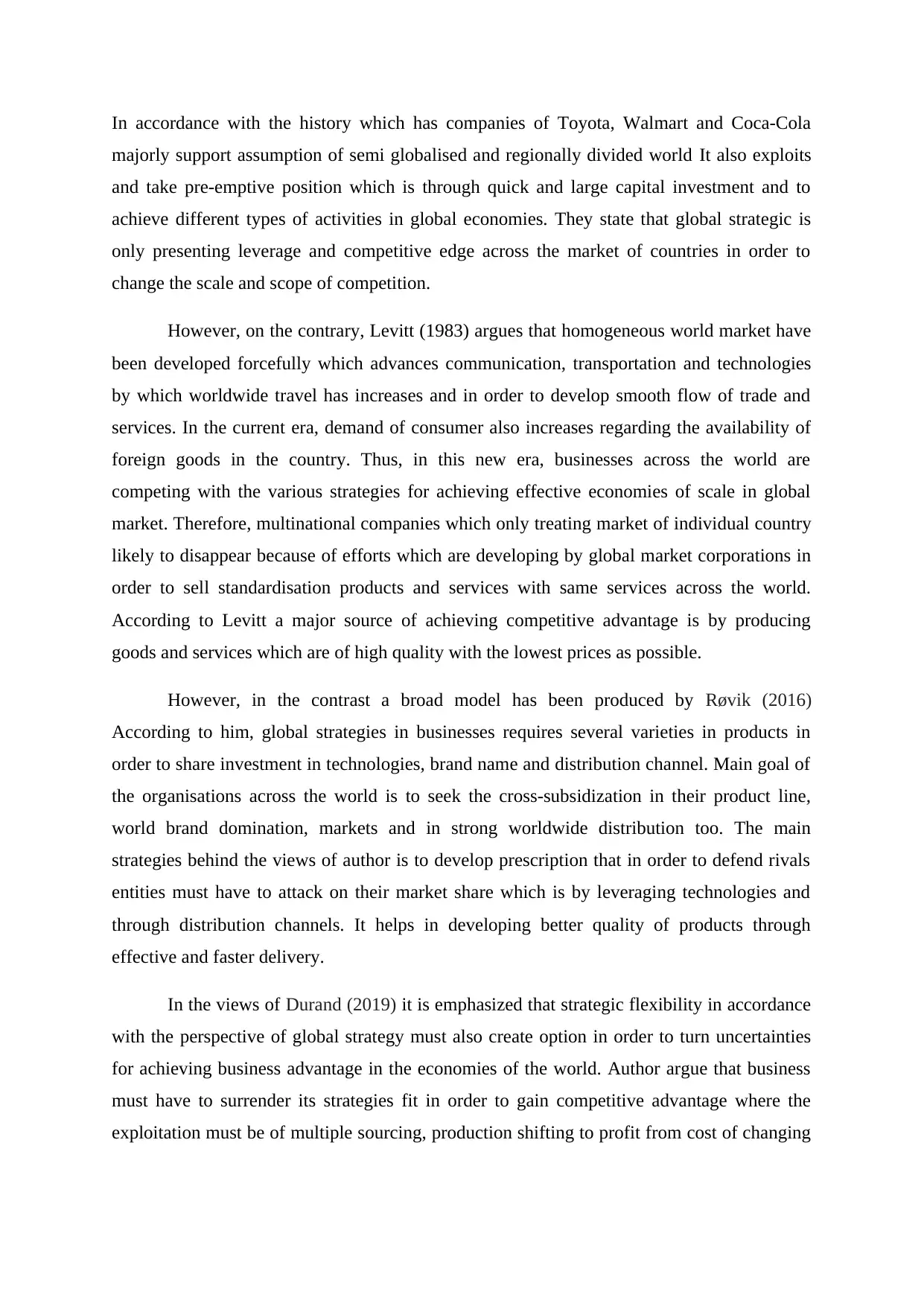
In accordance with the history which has companies of Toyota, Walmart and Coca-Cola
majorly support assumption of semi globalised and regionally divided world It also exploits
and take pre-emptive position which is through quick and large capital investment and to
achieve different types of activities in global economies. They state that global strategic is
only presenting leverage and competitive edge across the market of countries in order to
change the scale and scope of competition.
However, on the contrary, Levitt (1983) argues that homogeneous world market have
been developed forcefully which advances communication, transportation and technologies
by which worldwide travel has increases and in order to develop smooth flow of trade and
services. In the current era, demand of consumer also increases regarding the availability of
foreign goods in the country. Thus, in this new era, businesses across the world are
competing with the various strategies for achieving effective economies of scale in global
market. Therefore, multinational companies which only treating market of individual country
likely to disappear because of efforts which are developing by global market corporations in
order to sell standardisation products and services with same services across the world.
According to Levitt a major source of achieving competitive advantage is by producing
goods and services which are of high quality with the lowest prices as possible.
However, in the contrast a broad model has been produced by Røvik (2016)
According to him, global strategies in businesses requires several varieties in products in
order to share investment in technologies, brand name and distribution channel. Main goal of
the organisations across the world is to seek the cross-subsidization in their product line,
world brand domination, markets and in strong worldwide distribution too. The main
strategies behind the views of author is to develop prescription that in order to defend rivals
entities must have to attack on their market share which is by leveraging technologies and
through distribution channels. It helps in developing better quality of products through
effective and faster delivery.
In the views of Durand (2019) it is emphasized that strategic flexibility in accordance
with the perspective of global strategy must also create option in order to turn uncertainties
for achieving business advantage in the economies of the world. Author argue that business
must have to surrender its strategies fit in order to gain competitive advantage where the
exploitation must be of multiple sourcing, production shifting to profit from cost of changing
majorly support assumption of semi globalised and regionally divided world It also exploits
and take pre-emptive position which is through quick and large capital investment and to
achieve different types of activities in global economies. They state that global strategic is
only presenting leverage and competitive edge across the market of countries in order to
change the scale and scope of competition.
However, on the contrary, Levitt (1983) argues that homogeneous world market have
been developed forcefully which advances communication, transportation and technologies
by which worldwide travel has increases and in order to develop smooth flow of trade and
services. In the current era, demand of consumer also increases regarding the availability of
foreign goods in the country. Thus, in this new era, businesses across the world are
competing with the various strategies for achieving effective economies of scale in global
market. Therefore, multinational companies which only treating market of individual country
likely to disappear because of efforts which are developing by global market corporations in
order to sell standardisation products and services with same services across the world.
According to Levitt a major source of achieving competitive advantage is by producing
goods and services which are of high quality with the lowest prices as possible.
However, in the contrast a broad model has been produced by Røvik (2016)
According to him, global strategies in businesses requires several varieties in products in
order to share investment in technologies, brand name and distribution channel. Main goal of
the organisations across the world is to seek the cross-subsidization in their product line,
world brand domination, markets and in strong worldwide distribution too. The main
strategies behind the views of author is to develop prescription that in order to defend rivals
entities must have to attack on their market share which is by leveraging technologies and
through distribution channels. It helps in developing better quality of products through
effective and faster delivery.
In the views of Durand (2019) it is emphasized that strategic flexibility in accordance
with the perspective of global strategy must also create option in order to turn uncertainties
for achieving business advantage in the economies of the world. Author argue that business
must have to surrender its strategies fit in order to gain competitive advantage where the
exploitation must be of multiple sourcing, production shifting to profit from cost of changing
Paraphrase This Document
Need a fresh take? Get an instant paraphrase of this document with our AI Paraphraser
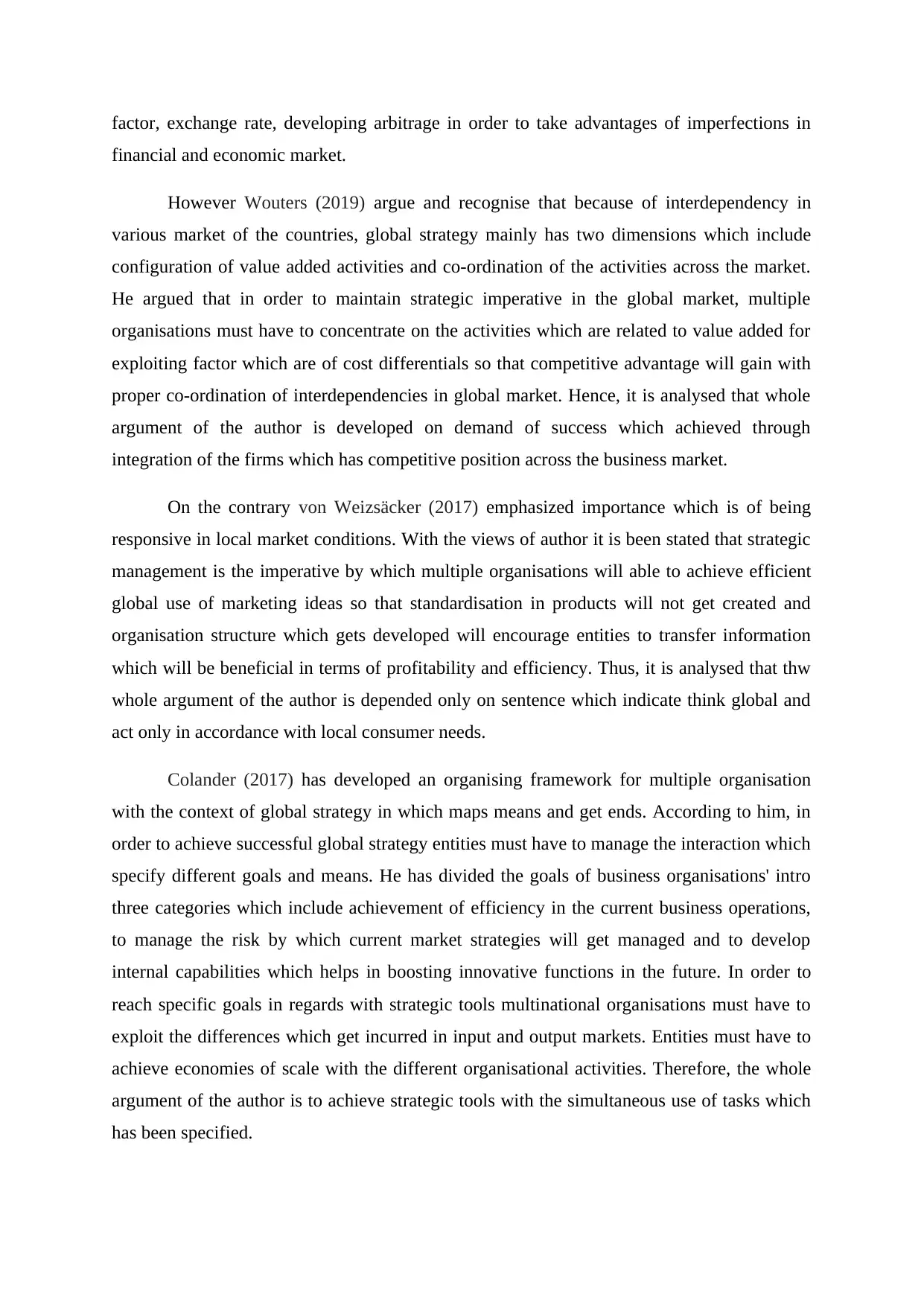
factor, exchange rate, developing arbitrage in order to take advantages of imperfections in
financial and economic market.
However Wouters (2019) argue and recognise that because of interdependency in
various market of the countries, global strategy mainly has two dimensions which include
configuration of value added activities and co-ordination of the activities across the market.
He argued that in order to maintain strategic imperative in the global market, multiple
organisations must have to concentrate on the activities which are related to value added for
exploiting factor which are of cost differentials so that competitive advantage will gain with
proper co-ordination of interdependencies in global market. Hence, it is analysed that whole
argument of the author is developed on demand of success which achieved through
integration of the firms which has competitive position across the business market.
On the contrary von Weizsäcker (2017) emphasized importance which is of being
responsive in local market conditions. With the views of author it is been stated that strategic
management is the imperative by which multiple organisations will able to achieve efficient
global use of marketing ideas so that standardisation in products will not get created and
organisation structure which gets developed will encourage entities to transfer information
which will be beneficial in terms of profitability and efficiency. Thus, it is analysed that thw
whole argument of the author is depended only on sentence which indicate think global and
act only in accordance with local consumer needs.
Colander (2017) has developed an organising framework for multiple organisation
with the context of global strategy in which maps means and get ends. According to him, in
order to achieve successful global strategy entities must have to manage the interaction which
specify different goals and means. He has divided the goals of business organisations' intro
three categories which include achievement of efficiency in the current business operations,
to manage the risk by which current market strategies will get managed and to develop
internal capabilities which helps in boosting innovative functions in the future. In order to
reach specific goals in regards with strategic tools multinational organisations must have to
exploit the differences which get incurred in input and output markets. Entities must have to
achieve economies of scale with the different organisational activities. Therefore, the whole
argument of the author is to achieve strategic tools with the simultaneous use of tasks which
has been specified.
financial and economic market.
However Wouters (2019) argue and recognise that because of interdependency in
various market of the countries, global strategy mainly has two dimensions which include
configuration of value added activities and co-ordination of the activities across the market.
He argued that in order to maintain strategic imperative in the global market, multiple
organisations must have to concentrate on the activities which are related to value added for
exploiting factor which are of cost differentials so that competitive advantage will gain with
proper co-ordination of interdependencies in global market. Hence, it is analysed that whole
argument of the author is developed on demand of success which achieved through
integration of the firms which has competitive position across the business market.
On the contrary von Weizsäcker (2017) emphasized importance which is of being
responsive in local market conditions. With the views of author it is been stated that strategic
management is the imperative by which multiple organisations will able to achieve efficient
global use of marketing ideas so that standardisation in products will not get created and
organisation structure which gets developed will encourage entities to transfer information
which will be beneficial in terms of profitability and efficiency. Thus, it is analysed that thw
whole argument of the author is depended only on sentence which indicate think global and
act only in accordance with local consumer needs.
Colander (2017) has developed an organising framework for multiple organisation
with the context of global strategy in which maps means and get ends. According to him, in
order to achieve successful global strategy entities must have to manage the interaction which
specify different goals and means. He has divided the goals of business organisations' intro
three categories which include achievement of efficiency in the current business operations,
to manage the risk by which current market strategies will get managed and to develop
internal capabilities which helps in boosting innovative functions in the future. In order to
reach specific goals in regards with strategic tools multinational organisations must have to
exploit the differences which get incurred in input and output markets. Entities must have to
achieve economies of scale with the different organisational activities. Therefore, the whole
argument of the author is to achieve strategic tools with the simultaneous use of tasks which
has been specified.
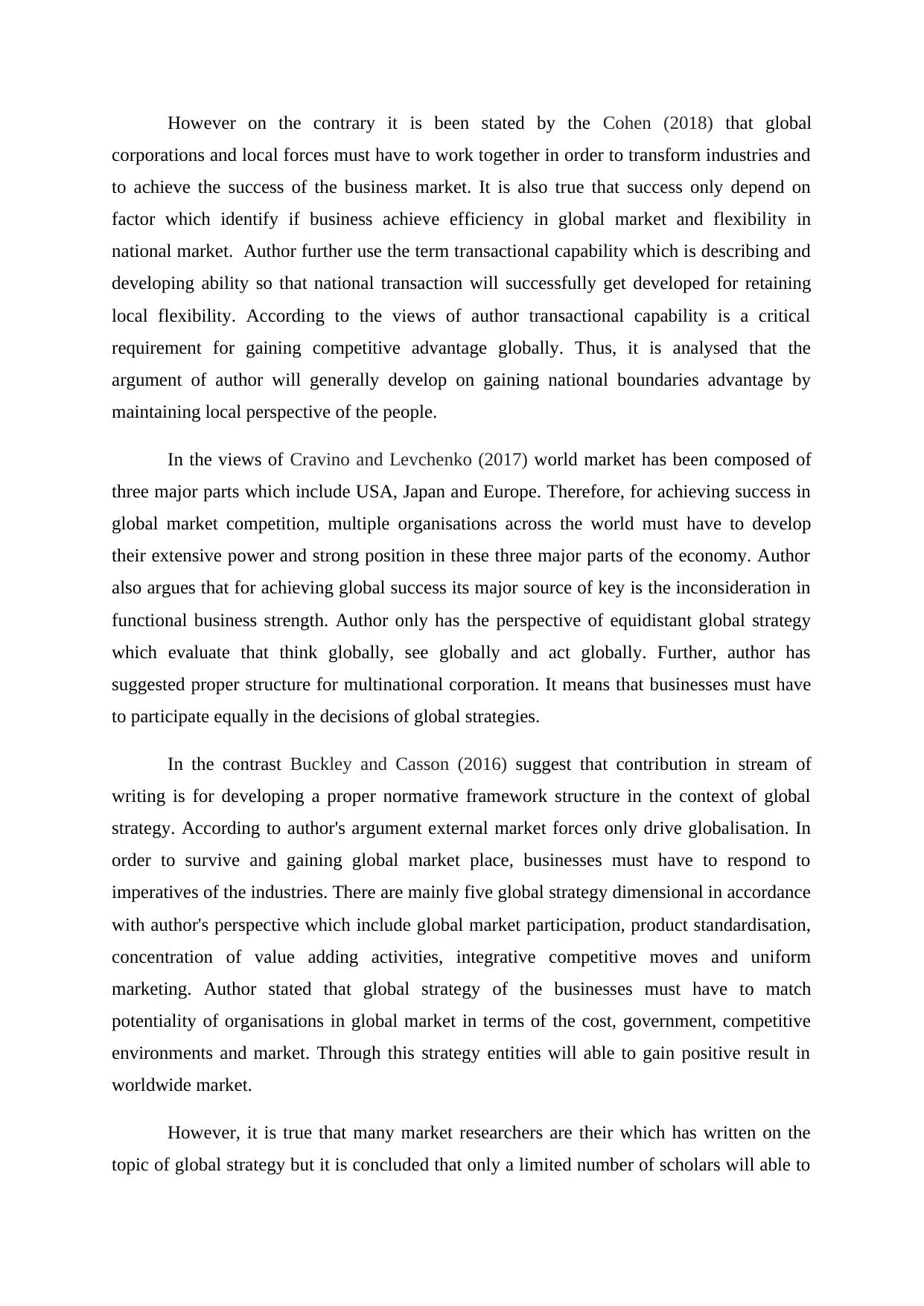
However on the contrary it is been stated by the Cohen (2018) that global
corporations and local forces must have to work together in order to transform industries and
to achieve the success of the business market. It is also true that success only depend on
factor which identify if business achieve efficiency in global market and flexibility in
national market. Author further use the term transactional capability which is describing and
developing ability so that national transaction will successfully get developed for retaining
local flexibility. According to the views of author transactional capability is a critical
requirement for gaining competitive advantage globally. Thus, it is analysed that the
argument of author will generally develop on gaining national boundaries advantage by
maintaining local perspective of the people.
In the views of Cravino and Levchenko (2017) world market has been composed of
three major parts which include USA, Japan and Europe. Therefore, for achieving success in
global market competition, multiple organisations across the world must have to develop
their extensive power and strong position in these three major parts of the economy. Author
also argues that for achieving global success its major source of key is the inconsideration in
functional business strength. Author only has the perspective of equidistant global strategy
which evaluate that think globally, see globally and act globally. Further, author has
suggested proper structure for multinational corporation. It means that businesses must have
to participate equally in the decisions of global strategies.
In the contrast Buckley and Casson (2016) suggest that contribution in stream of
writing is for developing a proper normative framework structure in the context of global
strategy. According to author's argument external market forces only drive globalisation. In
order to survive and gaining global market place, businesses must have to respond to
imperatives of the industries. There are mainly five global strategy dimensional in accordance
with author's perspective which include global market participation, product standardisation,
concentration of value adding activities, integrative competitive moves and uniform
marketing. Author stated that global strategy of the businesses must have to match
potentiality of organisations in global market in terms of the cost, government, competitive
environments and market. Through this strategy entities will able to gain positive result in
worldwide market.
However, it is true that many market researchers are their which has written on the
topic of global strategy but it is concluded that only a limited number of scholars will able to
corporations and local forces must have to work together in order to transform industries and
to achieve the success of the business market. It is also true that success only depend on
factor which identify if business achieve efficiency in global market and flexibility in
national market. Author further use the term transactional capability which is describing and
developing ability so that national transaction will successfully get developed for retaining
local flexibility. According to the views of author transactional capability is a critical
requirement for gaining competitive advantage globally. Thus, it is analysed that the
argument of author will generally develop on gaining national boundaries advantage by
maintaining local perspective of the people.
In the views of Cravino and Levchenko (2017) world market has been composed of
three major parts which include USA, Japan and Europe. Therefore, for achieving success in
global market competition, multiple organisations across the world must have to develop
their extensive power and strong position in these three major parts of the economy. Author
also argues that for achieving global success its major source of key is the inconsideration in
functional business strength. Author only has the perspective of equidistant global strategy
which evaluate that think globally, see globally and act globally. Further, author has
suggested proper structure for multinational corporation. It means that businesses must have
to participate equally in the decisions of global strategies.
In the contrast Buckley and Casson (2016) suggest that contribution in stream of
writing is for developing a proper normative framework structure in the context of global
strategy. According to author's argument external market forces only drive globalisation. In
order to survive and gaining global market place, businesses must have to respond to
imperatives of the industries. There are mainly five global strategy dimensional in accordance
with author's perspective which include global market participation, product standardisation,
concentration of value adding activities, integrative competitive moves and uniform
marketing. Author stated that global strategy of the businesses must have to match
potentiality of organisations in global market in terms of the cost, government, competitive
environments and market. Through this strategy entities will able to gain positive result in
worldwide market.
However, it is true that many market researchers are their which has written on the
topic of global strategy but it is concluded that only a limited number of scholars will able to
⊘ This is a preview!⊘
Do you want full access?
Subscribe today to unlock all pages.

Trusted by 1+ million students worldwide
1 out of 18
Related Documents
Your All-in-One AI-Powered Toolkit for Academic Success.
+13062052269
info@desklib.com
Available 24*7 on WhatsApp / Email
![[object Object]](/_next/static/media/star-bottom.7253800d.svg)
Unlock your academic potential
Copyright © 2020–2026 A2Z Services. All Rights Reserved. Developed and managed by ZUCOL.





